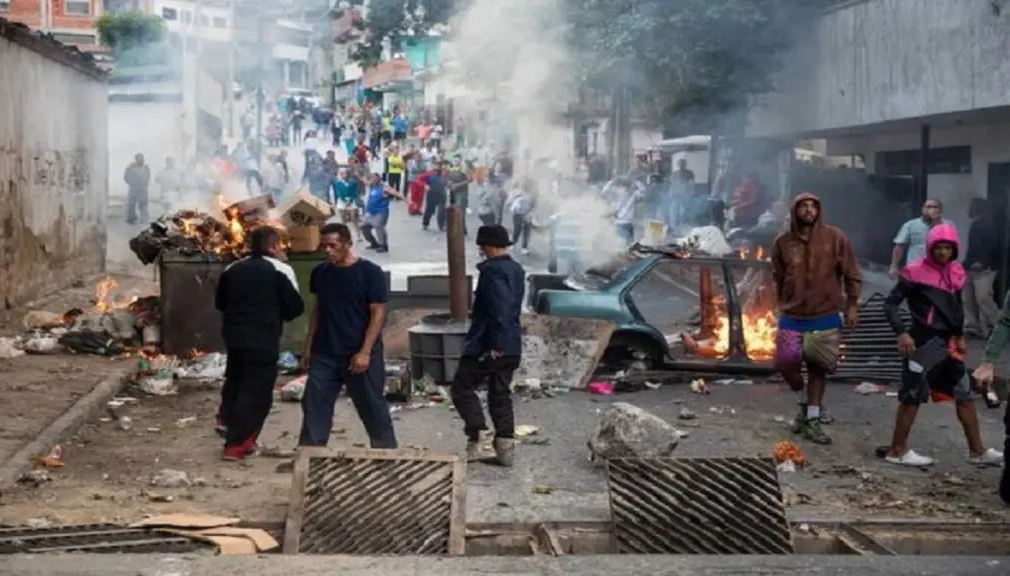
Caracas, December 1 (RHC)-- The Minister of Communications and Information of Venezuela, Freddy Ñáñez, stressed that the extremist right of his country did not have an electoral plan for the presidential elections of July 28th, but rather an insurrectional plan to destabilize the country, demand a foreign military intervention and violently overthrow the Government of the legitimate president Nicolás Maduro Moros.
Through his Telegram channel, the official posted: "This was the plan that María Corina and her criminal train had in store for July 28th, 29th and 30th in Venezuela. They were soundly defeated in that area," he said in reference to the plan conceived by María Corina Machado and former presidential candidate Edmundo González Urrutia.
Ñáñez's message commented on a tweet by violent opposition leader Leopoldo López, of the Voluntad Popular party, who wrote through X: "Rebels in Syria free political prisoners of the dictator (Bashar Al) Assad in Aleppo," while showing how terrorist groups free prisoners sentenced to prison in a jail in that northern city, whose control they took hours ago.
Ñáñez said that the extremist right, Machado and González Urrutia have not given up their violent agenda, which includes providing weapons to common criminals and prison "pranes" to provoke political changes in the homeland of Bolívar and Chávez.
On November 23rd, the Minister of Internal Affairs, Justice and Peace, Diosdado Cabello, denounced the existence of conspiratorial plans called "No to Christmas," which seek to tense the national scene in view of January 10, 2025, the date on which Nicolás Maduro will be sworn in as re-elected president of Venezuela.
According to Cabello, a group of businessmen, public officials and operators on the ground based in the state of Zulia (northwest), among other entities, are involved in these plans.
They were articulated with the support of the U.S. Government and by the representative of the extreme right, María Corina Machado. Also by the fugitive from justice Iván Simonovis, who has intervened in previous violent plots coordinating the arrival of weapons and other resources to Venezuela.
One of its financiers is the businessman from Zulia, José Enrique Rincón, who directs this plan from Spain (where he resides). Rincón is linked to recent sabotage of the electrical system, sponsored the aforementioned plan with 20 million euros (21.16 million dollars), owns farms and facilities where mercenaries are trained and maintains contacts with Simonovis.
Cabello denounced that there are other funds from terrorist groups linked to drug trafficking, which are led by Machado and have logistical support from Colombian paramilitaries led by former presidents Álvaro Uribe (2002-2010) and Iván Duque (2018-2022).
After arduous investigations, Venezuelan authorities seized a group of high-caliber weapons that would be used to attack Bolivarian leaders and electrical headquarters, oil headquarters and the Guri hydroelectric plant (Bolívar state, southeast).
The investigations also helped to identify a site where Colombian paramilitaries linked to the same characters who participated in Operation Gedeón (2020) were training and led to the arrest of judges and prosecutors from Zulia. In addition, it was learned that paramilitary groups are training in Colombia and Ecuador to attack Venezuela.
Cabello reported on the seizure of high-caliber weapons sent from the US to be used in violent acts against the peace and stability of Venezuela.
This plan conceived, among other points, that the weapons sent to Venezuela by Simonovis would be delivered to criminal groups and "pranes", with the collaboration of corrupt judges and prosecutors from Zulia, now detained and under investigation.
This weaponry moves within the country through criminal gangs such as Tren del Llano (Apure and Guárico), Los Chévrolet (Aragua), Sabanas Altas (Falcón) and Yeico Masacre (Zulia).
There is no doubt that the extremist right wanted to take advantage of the Venezuelan democratic system to gain political control, and pretended to recognize the Powers and institutions when in reality it had a terrorist plan to do so.
On Thursday, the National Assembly approved the Liberator Simón Bolívar Organic Law against the Imperialist Blockade and in Defense of Venezuela, which provides for the application of criminal sanctions to political actors who call for sanctions and armed interventions against the country, as Machado and González Urrutia did.

